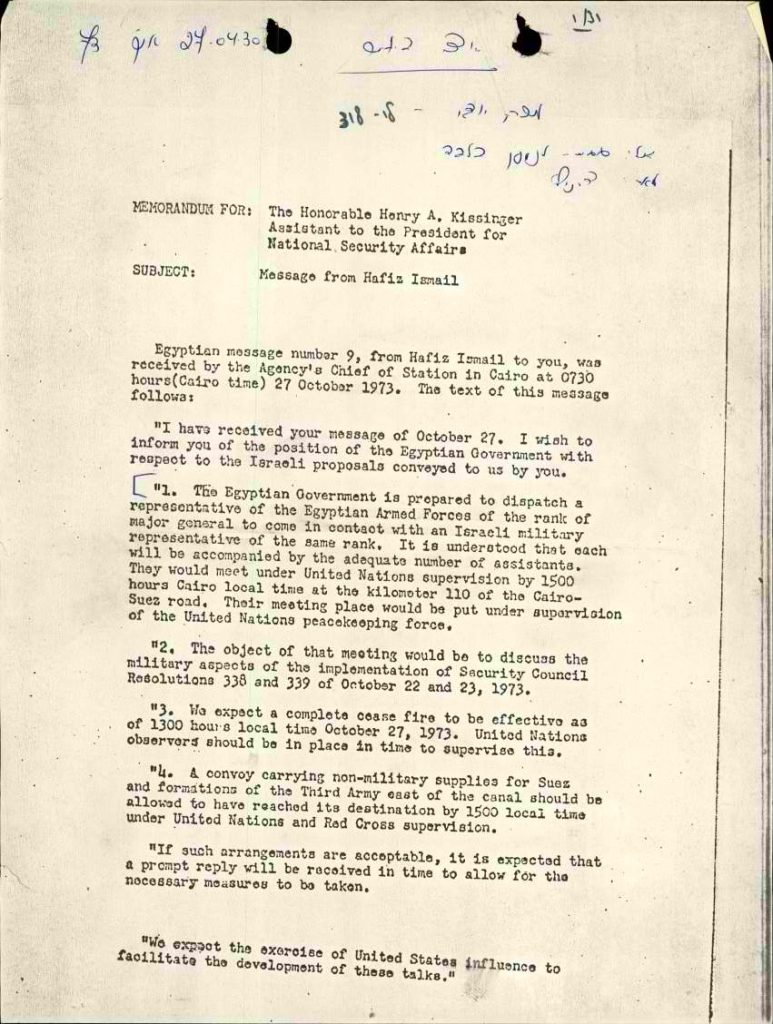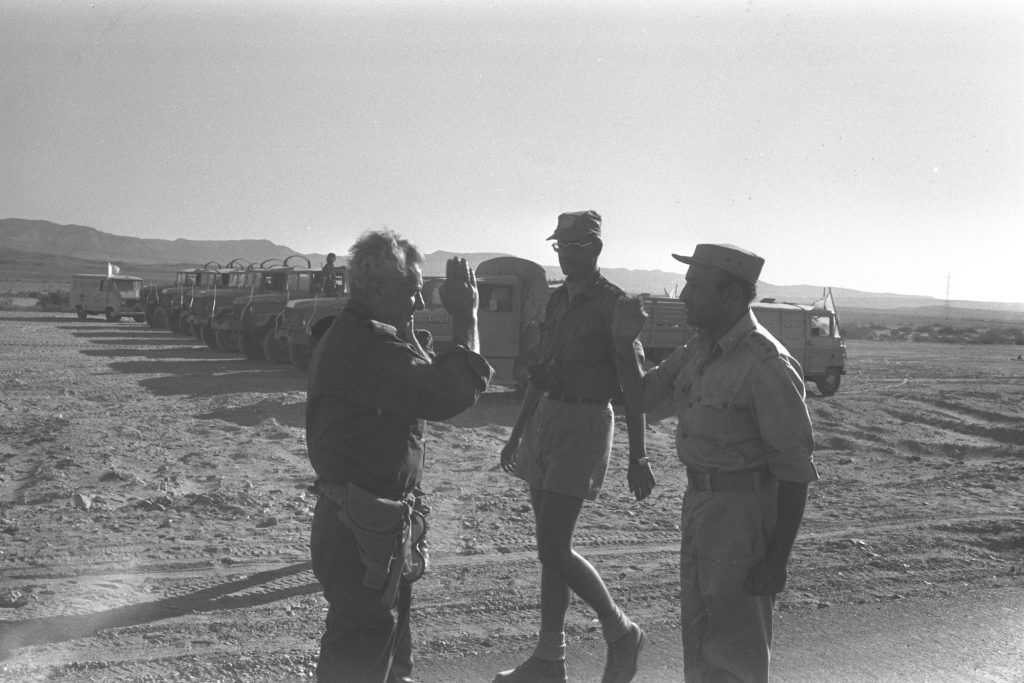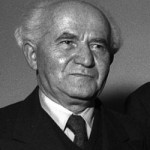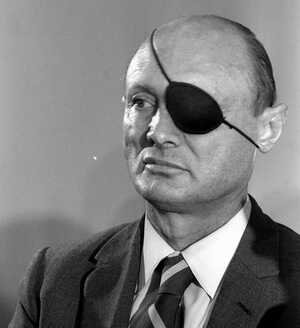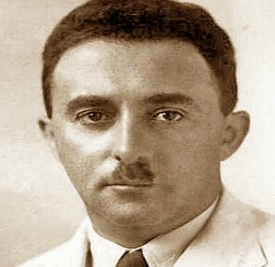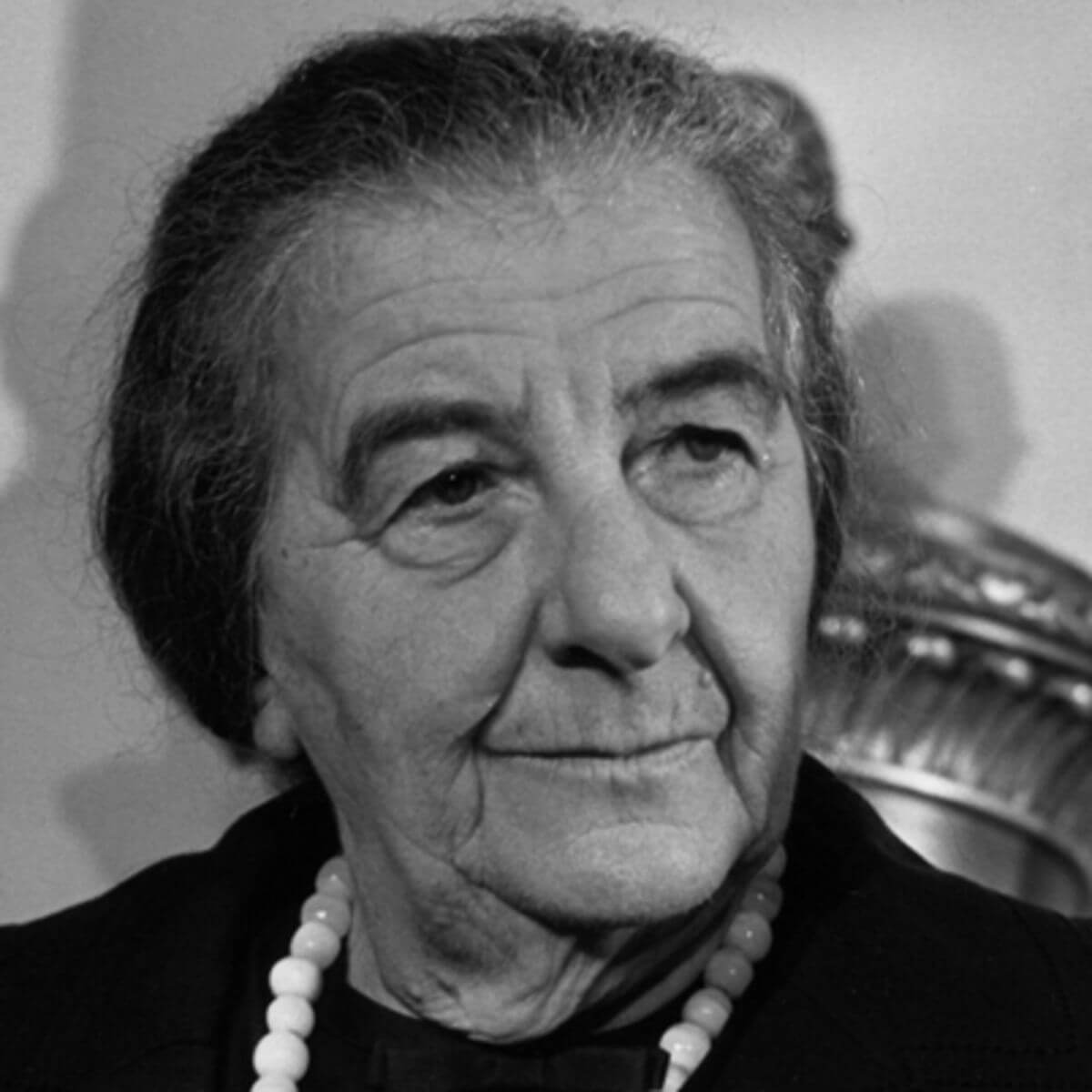.1 | "We Must Understand That the Russians Will Not Permit Us to Destroy the Third Army"
At 09:30 the government convened to discuss violations of the ceasefire by the Egyptians, the UN emergency force to supervise the ceasefire, the Third Army and the city of Suez. Dayan reported on the deployment of the UN observers on the Egyptian and Syrian fronts. He outlined the differences between the various UN forces. Eban added that, unlike the observers, the emergency force would actually hold territory and serve as a buffer between the armies. He said that the force was created to “reduce the international temperature, which had reached virtually feverish heights”. As for the confrontation with the Soviets, he claimed that the crisis was genuine, and that the Soviets had made actual preparations for military intervention.
Dayan said that at present only the transfer of plasma to the Third Army was approved. As for Suez, the civilian governor wanted to surrender, but the forces of the Egyptian army there refused. The capture of Suez would ensure the complete encirclement of the Third Army. With the memory of the failed attack still fresh, he proposed not to carry out a military attack and to wait for the city to surrender and the Egyptian commando forces to agree to leave. Several ministers, among them Warhaftig and Eban, opposed his proposal. The foreign minister said that the crisis was not yet over, because the Soviets were determined to prevent the surrender and humiliation of the Third Army. On the issues of return to the 22 October lines, the fate of the Third Army and of Suez, Israel could still expect great pressure. The capture of Suez, in this atmosphere, was a provocation that would stretch patience with Israel to the limit.
Several ministers, such as Kol and Sapir, agreed that the IDF should not enter the city and Israel should certainly not make this decision at this time. They wondered whether the US would stand with Israel against the Soviets if another crisis developed. Peres hinted that the crisis between the super-powers had been exaggerated out of all proportion, and thus there was no reason to panic in advance about political pressure on the issue of Suez. Allon and Hillel preferred to authorize the prime minister and the minister of defence to decide the issue in accordance with future developments; on the understanding that this did not include a military attack on the city. The general mood was that Israel should not withdraw to the 22 October lines, but confrontation with the Americans should be avoided. As for the Third Army, some proposed that Israel should continue, and even expand, humanitarian gestures and others opposed any step beyond sending plasma to the wounded.
The prime minister expressed surprise at the bitter argument that had developed. Discussions of this sort had occurred when the situation was bad, she said, whereas now the problems were the result of Israeli success, and there was no need for them. Despite the tension and sharp words between Israel and the US in recent days, “they’re pleased that we’ve reached the places we’ve reached on the west bank [of the Suez Canal]. They’re sorry we didn’t do more”. She called for the safeguarding of good relations with the Americans. “The US is precious to me, I come from there. It was actually my second homeland”. As for the city of Suez, she noted that if the Egyptian army left and the UN emergency force went in, that would not be to Israel’s advantage. She supported the IDF’s ‘quiet’ entry into the city and taking responsibility for it. The government decided to accept the creation of a UN emergency force to supervise the ceasefire. In addition, it decided that there would be no military initiative by the IDF to capture Suez. If an offer were made for the surrender of the city, the IDF commander there would be authorized to accept it, but the entry of IDF forces would be dependent on approval by the government. In addition, the government approved the continuation of the policy on the Third Army, aiming at its complete encirclement. No transfer of any supplies would be made, except for plasma for the wounded (For the full minutes of the meeting, see: Government Document No. 24).
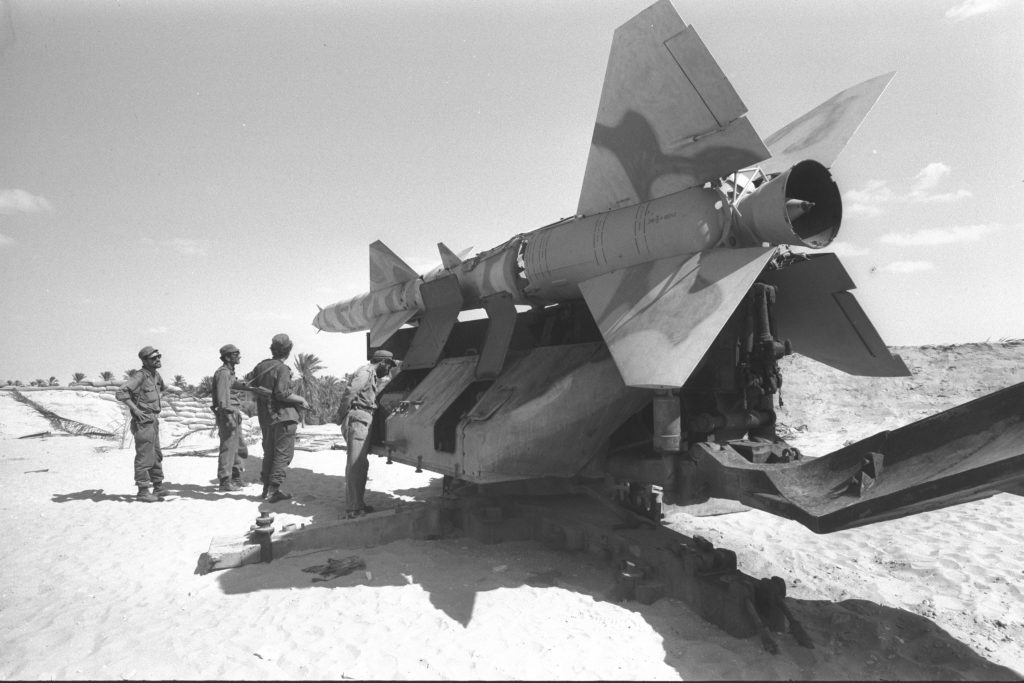
Israeli soldiers looking at a SAM 2 missile on the west bank of tthe Canal, 26 October 1973. Yigal Tumarkin, GPO
Later that day reports were received that the Egyptians were attacking in the Third Army sector and attempting to cross the Canal westwards at five points, and that Dayan had approved the use of the air force against them. These reports were sent to the Americans (See: Telegrams Nos. VL/29, 33).
The decisions of the government on supply of the Third Army were unacceptable to the Soviets, but they also did not suit the US. Kissinger had reached the conclusion that the destruction of the Third Army would harm the balance he wanted to create in the feelings of the two sides about their achievements in the war, a balance vital for the success of the diplomatic negotiations that he planned. Although Israel had won, it did so at a high price. Although the Arabs had lost, they did it in an honourable way, and they knew now that only the US was capable of obtaining territory for them.
The dispute between Israel and the Americans was at first conducted in a low key. Dinitz had relayed that Kissinger had received “a hysterical message from Sadat”, in which he complained that the Third Army was in a bad state, and that Israel was demanding its surrender. Sadat threatened that he would take “unilateral action”, and Kissinger asked Dinitz what Israel could propose “as a humanitarian gesture in the way of non-military supplies to the besieged force”(See: Telegram No. LV/300 above).
In a discussion with the minister of defence and the COGS at 19:30, Dayan said that the situation on the northern border was now ripe for dealing with an exchange of POWs. They could also request evacuation of the Jews of Damascus. As for Kissinger’s question, Dayan proposed reaching a joint position with the Americans. He even proposed allowing the Third Army to withdraw with its equipment, in order not to allow Egypt to send in supplies that would turn it into an effective fighting force in its present location. The COGS repeated his opinion that “perhaps in one or two days they [the Third Army] would reach a catastrophic state”, which would result in them leaving without their weapons. Golda reminded them that after all, it was not Kissinger alone who would determine the way things went. “Congress will not allow Nixon to become entangled on this issue”, she said.
During the evening massive American pressure was exerted, and Israel’s proposals were rejected by Kissinger as insufficient. “You will bring on yourselves a confrontation with the Soviets, and make it difficult for us to stand by you”, Dinitz quoted Kissinger, who added that the president himself was exerting pressure on the issue. Israel must understand that the Russians will not permit it to destroy the Third Army. The secretary proposed to Israel that it announce its agreement to the transfer of food and water to the besieged Army, and requested an immediate reply (See: Telegram No. LV/304).
Gradually the tone of the exchanges grew more heated, as shown in the journal and the telegrams sent by Dinitz throughout the night. At 21:30 Dinitz sent a very tough message from Eagleburger, in Kissinger’s name, which claimed that American sources were reporting that Israel had started the fighting that day. If the reports were correct, they would have to come out publicly against it. Dinitz replied in a no less sharp tone, and asked him to tell Kissinger that he was not prepared constantly to receive threats even before the facts had been established (See Telegram No. LV/307). After this, Lior told Dinitz that the American military attaché in Israel had been briefed, and that the fighting had started as a result of the attempts of the Third Army to break out of the encirclement. He raised the proposal that Yariv should go to Washington to explain the true situation.
However, shortly afterwards, Lior told Golda that the COGS had authorized bombing by the air force on a scale much greater than that approved by the minister of defence. Dayan related that he had shouted at Elazar and proposed that the prime minister rebuke him. But even after Kissinger was convinced that it was not Israel that had initiated the fighting, he stepped up the pressure. In a tense talk with Dinitz, whose full text was sent to the prime minister’s bureau, the secretary pressed Israel to agree immediately to the transfer of food and water because the situation was nearing boiling point.
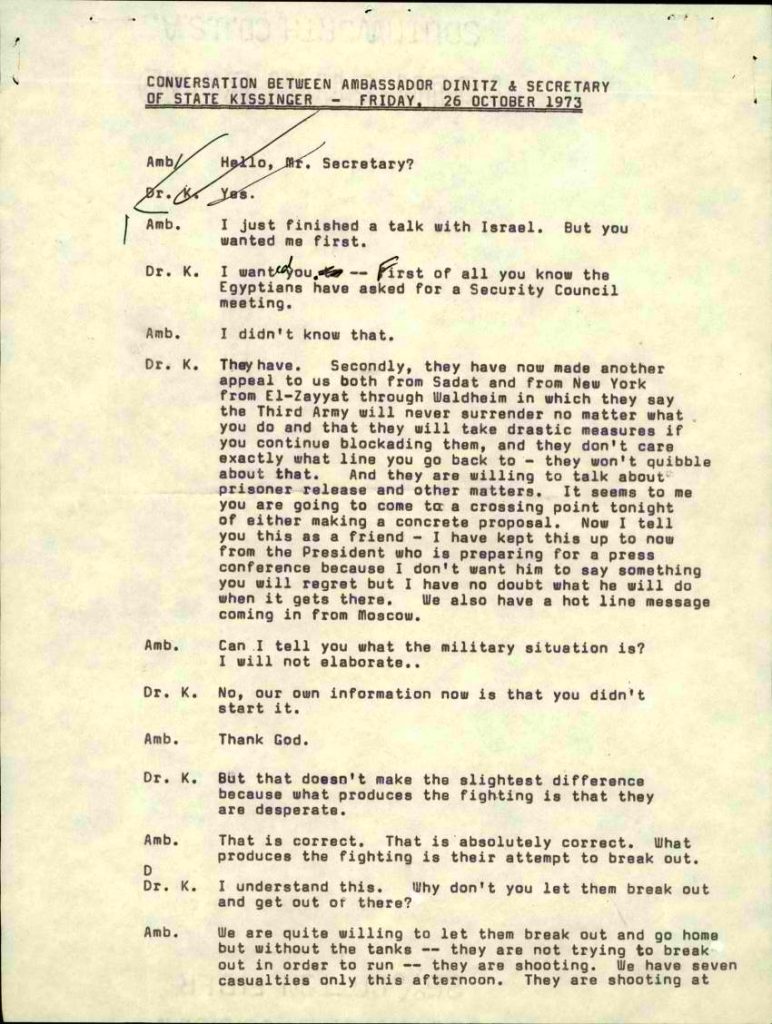
First page of the transcript of Dinitz’ talk with Kissinger, 26 October 1973, File A 4996/5, p. 181
“Why don’t you let them take their goddamn tanks with them, the Russians will replace them anyway” said the secretary, and added that Israel was dragging the super-powers into a global confrontation (See Telegrams Nos. LV/308, 310). Dinitz explained that Israel wanted something in return for its gesture and Kissinger urged him to produce a concrete proposal. The US would support immediate talks with the Egyptians on the problem.
Golda could not understand the American position. She told Dinitz that Israel was prepared to meet with the Egyptians “at any time and in any place”, in order to search for a solution that would preserve the Egyptians’ honour, and there would be “no surrender, no humiliation in it”. “The honour of every nation in the world must be preserved. It is only us that can be abandoned”, she said with cynicism. The day concluded with a kind of reprimand from Golda to Elazar, who claimed that all the operations by the air force had been carried out with the approval of Dayan (For the full entry of that day, see: the Prime Minister’s Bureau Journal – 26.10.73).

